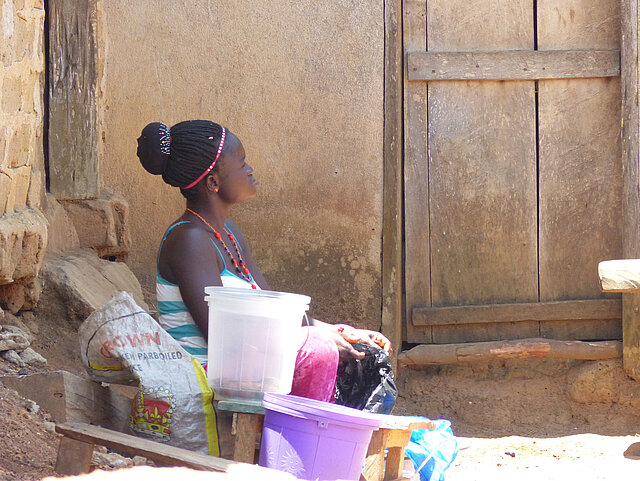The traumatic experience of sexual assault is often followed by a lifetime of misery. Many victims bear injuries that mark them for the rest of their lives: vaginal fistulas are injuries to the bladder wall with a permanent opening between the bladder and the vagina, and sometimes to the bowel. Women with a fistula are incontinent. Because they can no longer control their urine and bowel movements, many are abandoned by their husbands and disowned by their families. They live isolated, impoverished lives and have little chance of finding a husband again or making a living on their own. The pain is compounded by grief and hopelessness. "Many of the affected women do not understand what is wrong with them and that they could get help," explains head physician Dr Seraphin Amani from Curran Hospital in Liberia.
Hope for marked women in Liberia
About 200 survivors of sexual violence are treated each year at the Lutheran Church's Curran Hospital. It is located about 250 kilometres inland in Zozor, a region that was affected by the civil war and where many traumatised people live. In a separate consultation hour, staff members take care of people who have experienced sexualised violence. "Two decades of armed conflict have left their mark on the Mano River region in West Africa," says Seraphin Amani, who himself comes from the Democratic Republic of Congo and worked for Doctors Without Borders for many years. He learned to perform the special fistula operations from Nobel Peace Prize laureate Dr Denis Mukwege at Panzi Hospital. "One legacy of these conflicts is the high level of sexualised violence in Liberia." At Curran Hospital, women are helped individually.
Treatment ans psychological care
Women with fistulas as a result of violence or after complications during childbirth are operated in the hospital. In part, this is done free of charge, as many women have no health insurance. In order not to stigmatise the affected women, they are treated regardless of their history. For this purpose, employees of the Curran Hospital are sensitised to the topic and trained in dealing with affected women. The costs for medication, medical instruments and consumables for the operation and the subsequent inpatient care of the women are covered by DIFÄM. The victims of sexualised violence are then psychologically cared for by specialised staff.
DIFÄM promotes
- clinical care for women with fistulas after sexualised violence
- psychological care
- sensitisation and awareness raising
"For each of the healed women, a road of suffering that has lasted for years and sometimes decades comes to an end. The surgery enables them to find their way back into the community and back into life," says Dr Amani.
Education and sensitisation
However, since many affected women live in rural areas and have mostly never heard of fistula surgery, the treatment is preceded by an awareness-raising phase: trained volunteers will raise the issue in the surrounding communities and create awareness. By dealing with the issue more openly, people who have experienced violence are to be encouraged to come forward and receive care. This will involve victims telling their stories of suffering and how they were helped. In addition, 100 local authorities such as pastors and traditional leaders are to be sensitised and gained as multipliers. "Our work in the hospital is symptom treatment. Sexualised violence, like gender-based violence such as early marriage, forced prostitution and genital mutilation, is a structural problem that needs to be addressed at multiple levels."
Background
Two million women worldwide live with vaginal fistula. Up to 150,000 new cases occur every year as a result of inadequate obstetric care or sexual assault. In industrialised countries, fistulas are no longer a problem thanks to modern obstetrics. For more than ten years, Difäm has been supporting the surgery of vaginal fistulas in the east of the Democratic Republic of Congo. In Liberia, the project has just started at Curran Hospital.


